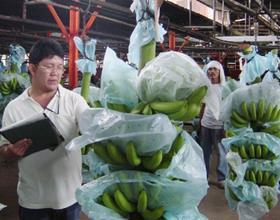
In the Philippines, a groupbacking the aerial spraying of banana crops in Mindanao has called for an independent study to be carried out by the government before it opts to ban the practice on the back of a Department of Health (DOH)recommendation.
The group has expressed concern that any ban on aerial spraying could detract from the country's rapidly expanding export industry, which is one of the most prominent in the world.
Simon Cuyson, executive director of Croplife, told the Philippine Star that the DOH's findings were considered inconclusive in a peer review by the World Health Organisation, and, as such, an independent look at the issue was required.
'The whole decision-making process is now complicated by politics,' said Mr Cuyson.'Aerial spraying is a health issue as much as it is an issue about agriculture – about people's rights to decent life, about people’s freedom from hunger, about the very livelihood of people living in the banana growing provinces of Mindanao.'
He added that in the 40 years aerial spraying had been conducted in Mindanao's banana plantations, there had beenno reports of disease or death attributable to the practice.
The Philippines ranks second, behindEcuador, as the largest banana exporting country in the world, contributing more than US$700 million annually to the country's economy.
The country has proved an attractive proposition for importers in recent times, withAustralia and, more recently, the US beginning to open up their markets to Filipino bananas.
Indeed, access to the US hasmoved closerthis year, withthe United States Department of Agriculture issuing an import risk analysis stating thatentry may be granted if measures are put in place to address 14 quarantined pests.



